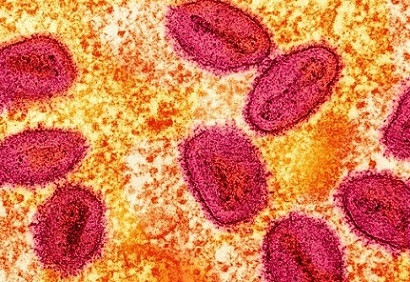Nikhil Prasad Fact checked by:Thailand Medical News Team Aug 18, 2024 1 year, 5 months, 4 weeks, 1 day, 1 hour, 36 minutes ago
Mpox News: The Mpox virus, a close relative of the notorious smallpox virus, continues to pose a significant threat to global public health. Since its identification in 1958, and particularly in the wake of the recent outbreaks starting in 2022, researchers have been striving to understand the intricate mechanisms that allow this virus to evade the immune system and cause disease. In this
Mpox News report, we delve into a study conducted this early this year by a team of researchers from Jiangxi Agricultural University in China, which sheds light on how the F3 protein of the Mpox virus interacts with host cells to trigger immune responses and induce cell death through apoptosis. This news report highlights the groundbreaking findings that could pave the way for new therapeutic strategies against Mpox.
 The Mpox virus’s F3 protein triggers immune responses and apoptosis
The Mpox virus’s F3 protein triggers immune responses and apoptosis
The F3 protein, encoded by mpox, is an apoenzyme believed to possess a double-stranded RNA-binding domain (dsRBD). However, limited research has been conducted on its function
The Study: Investigating the F3 Protein
Researchers from the Institute of Pathogenic Microorganism, Nanchang City Key Laboratory of Animal Virus and Genetic Engineering, and the College of Bioscience and Engineering at Jiangxi Agricultural University conducted a comprehensive analysis of the Mpox virus's F3 protein. Using a combination of transcriptomics and proteomics, they aimed to understand how this protein interacts with host cells and its role in the viral life cycle. The study utilized HEK293T cells, which were transfected with the Mpox-F3L gene, and the results were analyzed through RNA sequencing (RNA-seq) and liquid chromatography-tandem mass spectrometry (LC-MS/MS).
Key Findings: Unveiling the Role of F3 Protein
-Immune Response Activation: The study revealed that the F3 protein plays a crucial role in activating the host's immune response. Transcriptomic analysis identified 1,672 differentially expressed genes (DEGs) in the host cells, with 1,156 genes being up-regulated and 516 down-regulated. Notably, several key genes involved in the innate immune signaling pathway, such as RIGI, MDA5, IRF5, IRF7, IRF9, ISG15, and IFNA14, were significantly up-regulated. These genes are critical for recognizing viral double-stranded RNA (dsRNA) and initiating a broad spectrum of antiviral immune responses. The study suggests that the Mpox-F3 protein enhances the host's ability to detect and respond to the virus, potentially limiting its replication and spread.
-Induction of Apoptosis: The F3 protein also appears to play a role in inducing apoptosis, or programmed cell death, in infected cells. The study found that the F3L up-regulates the expression of the FOS and JNK genes while down-regulating the TNFR2 gene. The FOS and JNK genes are associated with apoptotic pathways, while TNFR2 is known to promote cell survival. By tipping the balance towards cell death, the F3 protein may help the virus evade immune detection and facilitate the release of viral particles from
dying cells. This dual role in activating immune responses and inducing apoptosis highlights the complexity of the Mpox virus's interaction with its host.
Proteomic Insights: Host-Protein Interactions
To complement the transcriptomic findings, the researchers also conducted a proteomic analysis to identify host proteins that interact with the F3 protein. The analysis revealed 27 cellular proteins that interact with F3, with 19 of them showing significant changes in abundance. These proteins are primarily involved in RNA splicing and protein translation, processes that are critical for viral replication and assembly. The interaction between F3 and these host proteins suggests that the Mpox virus may hijack the host's cellular machinery to facilitate its own replication while simultaneously suppressing the host's antiviral defenses.
Discussion: Implications for Therapeutic Strategies
The study's findings have significant implications for the development of new therapeutic strategies against the Mpox virus. By understanding how the F3 protein manipulates host immune responses and induces apoptosis, researchers can target these pathways to develop antiviral drugs that block the virus's ability to replicate and spread. Additionally, the identification of host proteins that interact with F3 opens up new avenues for research into how the Mpox virus hijacks cellular processes, potentially leading to the development of treatments that disrupt these interactions.
Conclusions: A Step Forward in Mpox Research
In conclusion, this study provides valuable insights into the complex mechanisms by which the Mpox virus interacts with its host. The F3 protein plays a dual role in activating immune responses and inducing apoptosis, highlighting its importance in the viral life cycle. By shedding light on these processes, the study paves the way for future research aimed at developing targeted therapies to combat Mpox infections. As the virus continues to pose a global threat, understanding its molecular biology is crucial for controlling its spread and mitigating its impact on public health.
The study findings were published in the peer-reviewed journal: Frontiers in Cellular and Infection Microbiology.
https://www.frontiersin.org/journals/cellular-and-infection-microbiology/articles/10.3389/fcimb.2024.1354410/full
For the latest
Mpox News, keep on logging to Thailand Medical News.
Read Also:
https://www.thailandmedical.news/news/unveiling-the-role-of-monkeypox-mpox-virus-a23-protein-in-human-cells
https://www.thailandmedical.news/news/new-insights-into-understanding-mpox-s-evasion-of-the-immune-system
